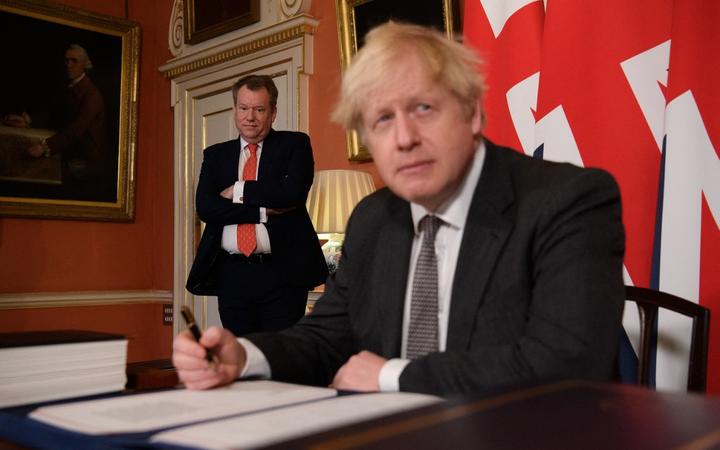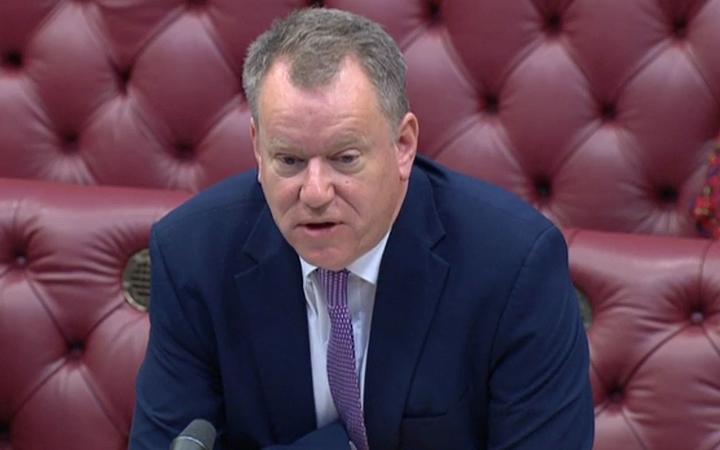Brexit minister Lord Frost has resigned from UK Prime Minister Boris Johnson’s government.
 David Frost looks on as UK Prime Minister Boris Johnson signs a trade deal with the EU on 30 December, 2020, at 10 Downing Street in London. Photo: AFP
David Frost looks on as UK Prime Minister Boris Johnson signs a trade deal with the EU on 30 December, 2020, at 10 Downing Street in London. Photo: AFP
Lord Frost led the UK’s negotiations over the EU Withdrawal Agreement and Northern Ireland Protocol.
In a letter to Johnson, Lord Frost said that while “Brexit is now secure” he had “concerns about the current direction of travel”.
The Mail on Sunday, which first reported the news, said he handed in his resignation a week ago, partly in disagreement with Covid-19 curbs.
In his letter, Lord Frost, who attended Cabinet, said his resignation would take “immediate effect” and spoke of his desire to see a “low-tax” economy.
“I hope we will move as fast as possible to where we need to get to: a lightly regulated, low-tax, entrepreneurial economy, at the cutting edge of modern science and economic change,” he said.
He added that measures to reopen the economy in July “did not prove to be irreversible” adding: “I hope we can get back on track soon and not be tempted by the kind of coercive measures we have seen elsewhere.”
Responding to Lord Frost, Johnson said he should be “immensely proud of your historic service to this government and this country”.
 Brexit Minister David Frost answers questions in the House of Commons in London last month. Photo: AFP / PRU
Brexit Minister David Frost answers questions in the House of Commons in London last month. Photo: AFP / PRU
It comes after a week where the prime minister suffered a by-election defeat with the Conservatives losing the previously safe seat of North Shropshire – which the party had held for nearly two centuries – to the Liberal Democrats.
He also endured the biggest rebellion of his premiership so far when many of his own MPs voted against the government over the introduction of so-called Plan B curbs in England.
A total of 99 Conservatives voted against the government, but the measures – including Covid-19 passes at larger venues – passed by a majority of 243 thanks to Labour support.
Lord Frost had most recently been engaged in negotiations with the EU over post-Brexit arrangements.
This included elements of the Northern Ireland Protocol, agreed by the UK and EU in 2019, that allows goods to cross the border between Northern Ireland and the Republic of Ireland without checks.
The protocol has been criticised by some businesses for making it more difficult to send goods to Northern Ireland from the UK.
DUP leader Sir Jeffrey Donaldson said Lord Frost’s resignation raised questions about the UK’s approach to the Northern Ireland Protocol.
Sir Jeffrey said Johnson “must now urgently decide which is more important – the Protocol or the stability of the political institutions”.
Northern Ireland’s deputy first minister, Sinn Fein’s Michelle O’Neill, said momentum was needed in negotiations to make the Protocol work better.
“The North will not be collateral damage in the Tory chaos,” she added.
Backbench Tory MP Andrew Bridgen said Johnson was “running out of time and out of friends to deliver on the promises and discipline of a true Conservative government”.
“Lord Frost has made it clear, 100 Conservative backbenchers have made it clear, but most importantly so did the people of North Shropshire,” he wrote on Twitter.
Conservative MP Simon Hoare, who chairs the Commons Northern Ireland Select Committee, said Lord Frost was “unsuited to the ‘doing of politics'” and “never understood the need for personal rapport or the importance of trust”.
Labour’s deputy leader Angela Rayner said the resignation suggested the government was “in total chaos right when the country faces an uncertain few weeks”.
Dissatisfaction since Brexit
In a speech last month, Lord Frost expressed his clear discontent with the current course of post-Brexit British policy.
“We have not successfully rolled back the frontiers of the European Union from Britain with Brexit, only to import that European model after all this time,” he said in a 22 November speech at the Margaret Thatcher Conference on Trade.
He disagreed with “those who think we can treat the private sector as just a convenient way of keeping the public sector running”.
“It isn’t just a source of taxes,” Frost said. “We can’t carry on as we were before, and if after Brexit all we do is import the European social model we will not succeed.”
After talks with the EU, Frost said on Friday that negotiations were not close to solving problems that the Northern Irish protocol he negotiated had created.
“It is disappointing that it has not been possible to reach either a comprehensive or worthwhile interim agreement this year,” Frost said. “A solution needs to be found urgently early next year.
“For as long as there is no agreed solution, we remain ready to use the Article 16 safeguard mechanism if that is the only way to protect the prosperity and stability of Northern Ireland and its people,” he said.

Leave A Comment